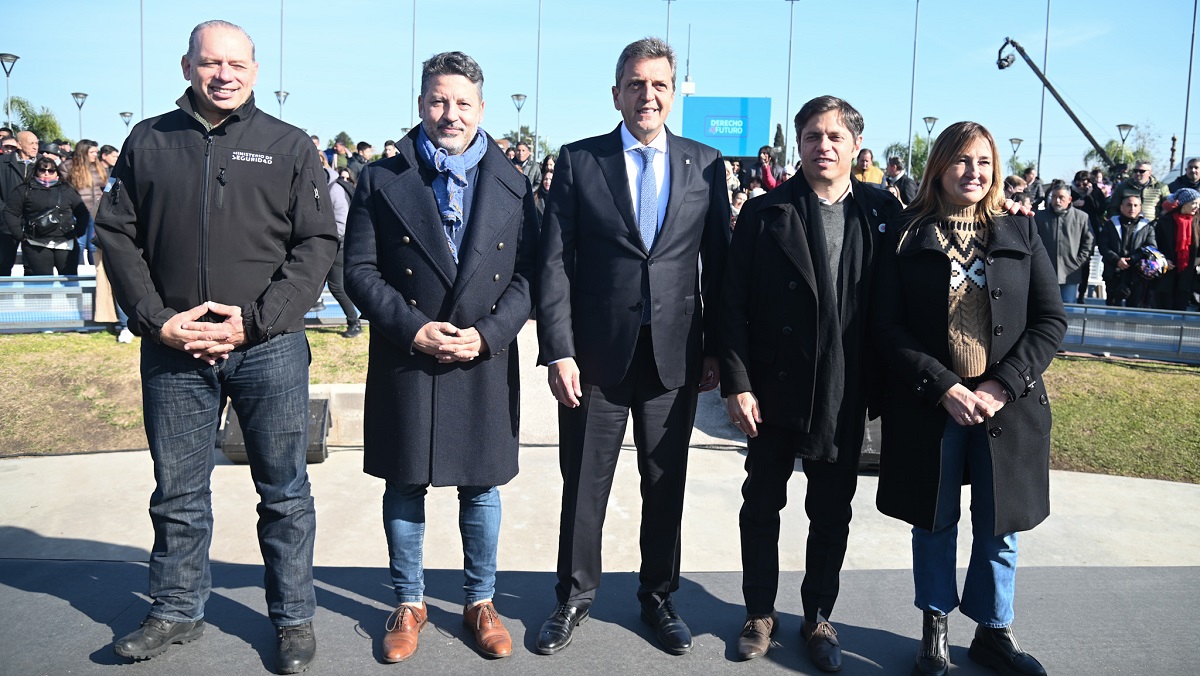
Sergio Berni had practically disappeared from the public scene after his clownish action, which earned him the punch of a driver from line 620. But now he reappeared as a candidate for provincial senator for the second electoral section of the province of Buenos Aires in the ballots headed by Sergio Massa (and also in the one headed by Juan Grabois).
This time he made his appearance together with Sergio Massa, Axel Kicillof and Gustavo Menéndez in the Merlo district, where the inauguration of a new operational base for the Neighborhood Approach Force – to which 41 patrol cars and 310 new troops joined – became a clear electoral campaign act.
Menendez, Massa, Kicillof and Berni held an act in #Merlo to make demagogy about “insecurity” giving in to the agenda of the right. But the greatest insecurity (and for which they are responsible) is the critical public health situation with emptied hospitals…(continue) pic.twitter.com/vRT1pnON7h
— David Maidana ✊🚩 (@DavidEzMaidana) July 20, 2023
If one wants to know what agenda the Unión por la Patria campaign responds to, the Página12 note on the act is eloquent. There he says “in the midst of the debate that the opposition candidates want to install around security in the Province of Buenos Aires, Kicillof led the inauguration of a new operational base for the Neighborhood Approach Force.” And there he took up his agenda, naturalizing the ideological discourse that the so-called insecurity is “fighting” with more and more police. And to accompany this speech, Sergio Berni appears, to show that they too can show a “strong hand” that will not hesitate to repress the popular sectors, as when they passed the bulldozers to the homeless residents of Guernica.
Opposite by the vertex to what the left points out that the police are insecurity because they are behind all major crimes such as drug trafficking, car junkyards, among others. To those who add the repression, the easy trigger, the arrests for “wearing a face”, the armed causes and many other crimes committed by the forces. And that the growth of minor crimes is closely related to the growth of social impoverishment. In this case, it is a product of the adjustment that this government is carrying out at the request of the IMF, continuing Macri. Could the drug gangs recruit so many young people if they had a genuine job proposal and a non-precarious future that values their lives? But Unión por la Patria does not ask this question: it responds to “right-wing” police sensationalism with “national and popular” police sensationalism.
And it continues to deepen the precariousness of life. The claims of the students who point out that “you cannot study with cold and hunger” in the district schools, the claims of the health workers of the Eva Perón Hospital who earn misery, or the salary claims of teachers and state workers are not attended to. For them there is adjustment, they are asked for “patience and effort” to comply with the illegal debt that Macri left with the IMF.
But taking care not to lose votes to the right, when Patricia Bullrich, Rodríguez Larreta and Gerardo Morales or Javier Milei ask for more police officers, the Peronist government immediately enables the budget items. In the words of Sergio Massa in the act itself: “there is no money better invested”. Something that contrasts with reality since Argentina is the Latin American country with the largest number of police officers per inhabitant, and yet crime continues to develop. The case of the “narco-police” in Rosario is eloquent: more police officers are equivalent to more allies for drug traffickers.
For his part, Axel Kicillof boasted of having renewed the 5,000 mobile phones of the Buenos Aires Police with 0 km patrol cars. Something that is obviously a priority for the governor. This is not the case to ensure that the students of high school 17 have a building since they are studying in a shed, that those of technical 5 are not infested with rats and bats, or that the residents of the Las Campanillas neighborhood have their health room.
If one wants to know the orientation of a government beyond the stories, one must look at what the budget is dedicated to. And a government that increases the budget for bullets, patrol cars and surveillance, while adjusting health and education, has a very clear orientation.
But it’s not just a budget issue. It is also ideological: the presidential candidate Sergio Massa, who once proposed putting the Army in the villas, referred to the judges and prosecutors and demanded that the “criminals” not “enter through one door and leave through the other.” Words that could well have come from the mouth of Patricia Bullrich or Javier Milei, but they were spoken by the one who heads the lists of Kirchnerism who definitively abandoned the “guarantee” of the “Human Rights government.”
And it went further. He declared “we can have the best motives, the best weapons and the most trained police officers, but if it stops and stops and justice releases and releases, the effort made in the fight against insecurity is of no use to us.” Equating “arrested” with “guilty” in a country where more than half of the prisoners are without conviction. And practically all of them are young people from popular neighborhoods, imprisoned for “wearing a face.”
Or by “parsleys”, such as the young men Axel and Gabriel Baronex who the Berni police detained to find a scapegoat for the murder of the 620 driver. And then it was learned, due to the actions of the family and not the State, that they were innocent and should have been released, while the murder continues unpunished despite the fact that the claim of their colleagues and the family forced the Government to say that it was investigating thoroughly. Or the bricklayer Mauricio Castillo, arrested for a crime he did not commit, and who appeared “suicided” in one of the police stations under the command of Berni in Lomas del Mirador.
Regarding the campaign act, councilor David Maidana – who is a pre-candidate for mayor on the lists of the left front headed by Myriam Bregman and Nicolás Del Caño – said: “from the bench that I occupy we have been supporting all the claims of the students, the teachers, the health workers in Merlo. And most were not answered or answered only with crumbs. For them there is no money because it goes to the IMF. But for the police there is always. Secondary students who attend precarious schools, when they receive it, it will be practically impossible for them to have a blank salary… unless they enter the police. There are always positions available there.”
And he continued: “these days the Congressional Budget Office published the adjustment numbers. The government cut social programs by 23.8%, retirement and pensions by 4.6% and family allowances by 28.2%. But for the repressive apparatus there is always money. In December 2021, we denounced that with the money they proposed to build two new prisons in Merlo, they could have built 1,200 houses to somewhat alleviate the very serious housing problem in the district. But the priorities for them, who lead a very comfortable life different from that of the majority, are very different from those of the people.
And he concluded: “They are scared by the growth of the right, but they take their agenda and make it grow. That is why in these elections raising the left together with Myriam Bregman and Nicolás Del Caño, is also a political position to combat the criminalization of poverty that they use to justify repression. And to finish with the adjustment of the government and of all those who adjust to the IMF. To take to the streets as the people of Jujuy did against the tyranny of Morales, who suffered the cruel repression of the police that the candidates of Unión por la Patria, Juntos por el Cambio and Milei are committed to strengthening”.
Source: www.laizquierdadiario.com

